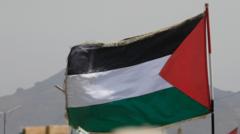Recognising a Palestinian state carries significant diplomatic and political weight within international relations. The recent statement by UK Prime Minister Sir Keir Starmer, indicating potential recognition by September should Israel not meet specific conditions, highlights an evolving stance among some Western nations. This act typically involves acknowledging Palestine as a sovereign entity with defined territory, a government, and the capacity to enter into relations with other states. Such recognition grants Palestine increased legitimacy on the global stage, strengthening its position in international bodies like the United Nations, where it currently holds observer status.
From a Palestinian perspective, recognition affirms their right to self-determination and an independent homeland, crucial for pursuing a two-state solution alongside Israel. It can pave the way for formal diplomatic relations, the establishment of embassies, and enhanced opportunities for international aid and cooperation. For countries extending recognition, it signifies a commitment to the two-state framework and a belief in the eventual establishment of a viable, independent Palestinian state living in peace next to Israel.
However, the act of recognition is complex and often contentious. While over 140 countries, predominantly in the Global South, already recognise Palestine, key Western powers have largely withheld full recognition, preferring to see it emerge from a negotiated settlement between Israelis and Palestinians. Proponents argue that recognition can rebalance power dynamics, providing Palestinians with greater leverage in future negotiations. Critics, including Israel, often contend that unilateral recognition undermines the peace process by preempting final status issues that should be resolved through direct talks, such as borders, security arrangements, and the status of Jerusalem. The conditions mentioned by the UK are likely tied to progress on these very issues, aiming to foster a pathway towards a negotiated and sustainable peace.



